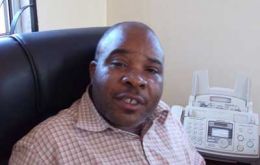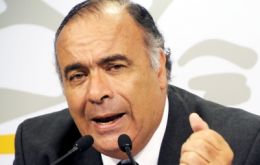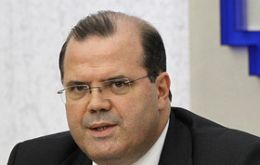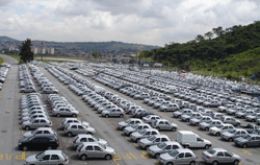MercoPress. South Atlantic News Agency
Economy
-
Monday, November 14th 2011 - 20:47 UTC
Brazil moves into Tanzania and will help increase power generation five-fold

Brazilian business and public contractor giant Odebrecht Company Limited, with top global businesses and operations across a wide variety of industries, has shown interest in undertaking the huge Stiegler's Gorge power project in Tanzania’s Rufiji river basin, according to “The East African” weekly.
-
Monday, November 14th 2011 - 20:18 UTC
Mercosur/EU confident of a first proposals exchange in mid 2012

The seventh round of Mercosur/EU trade negotiations held in Montevideo ended with “progress in some areas at regulation and norms levels” and with the commitment of exchanging proposals in mid 2012, according to Joao Aguiar Machado head of the EU team.
-
Monday, November 14th 2011 - 18:19 UTC
Most Latam banks target the SME sector to expand business, shows survey

A large majority of banks in Latin America and the Caribbean consider small and medium-sized enterprise (SME) as a strategic part of their business and are upbeat about expanding their business to this sector in the next two years, according to the Latin American Banking Federation, Feleban.
-
Monday, November 14th 2011 - 17:11 UTC
Mexican remittances rose in September at fastest pace in five years

Mexican remittances rose at the fastest pace in five years in September as immigrant workers took advantage of the Peso’s decline to send more money to relatives, according to the Mexican Central bank.
-
Monday, November 14th 2011 - 16:48 UTC
Uruguay has become an IMF creditor and contributed to bail-out Ireland

Uruguay has become a net creditor of the International Monetary Fund and given this condition has helped in the bailing out of such countries as Ireland and Angola, revealed a top authority of the Central Bank during a hearing before the country’s Senate’s Finance Committee.
-
Monday, November 14th 2011 - 07:37 UTC
Uruguay fears fall in value of the Argentine Peso could impact summer season

In the last eleven days the Argentine Peso has fallen almost 20% in neighbouring Uruguay where it has sounded alarm bells ahead of the coming season when hundreds of thousands of Argentines flood Uruguayan beaches.
-
Saturday, November 12th 2011 - 12:46 UTC
Brazil’s October consumer inflation down but still above target

Consumer price increases slowed month-on-month in Brazil in October, according to the Brazilian Institute of Geography and Statistics, IBGE. The official IPCA consumer price index gained 0.43% in October compared with a 0.53% rise in September.
-
Saturday, November 12th 2011 - 12:45 UTC
Brazil eases capital requirements for some consumer loans

Brazil’s central bank cut capital requirements for some consumer loans with maturities of up to five years, including car loans, as it seeks to fine tune measures taken last year to prevent excessive risk in the financial system.
-
Saturday, November 12th 2011 - 11:19 UTC
“Super” Mario Monti to the rescue of foundering Italy (and the Euro)

The man who is ready to succeed outgoing Silvio Berlusconi as Italy’s next Prime Minister is a well respected economist and tough negotiator “Super” Mario Monti.
-
Saturday, November 12th 2011 - 09:53 UTC
Argentina expects soy crop of 49.5 million tons and 30 million tons of corn

Argentina's 2011/2012 soy harvest is seen at 49.5 million tons, down from 50.3 million tons last season, the Rosario Grains Exchange said in its monthly crop report on Friday.
